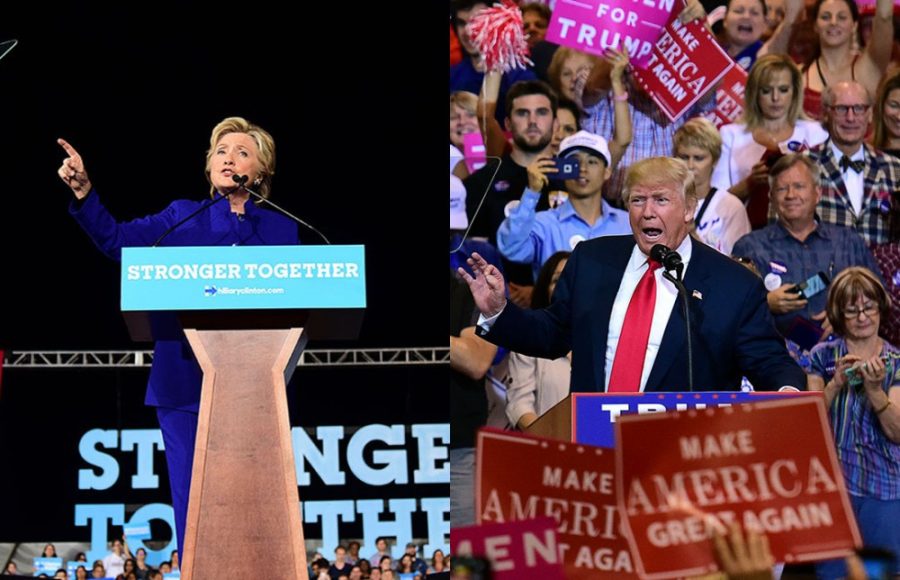Americans dislike uncivil political rhetoric, though the recent presidential election would seem to suggest otherwise.
A 2011 survey from the National Institute for Civil Discourse showed 82 percent of Americans agreed with the statement, “some negative advertisements are so nasty I stop paying attention to what the candidates are saying.”
That overall feeling likely hasn’t changed much, according to Carolyn Lukensmeyer, NICD executive director, though this election did tap into “very deep and very raw” personal feelings.
“We’ve never seen, in modern American political history, a presidential election that was this bitterly contested—that got this ugly in terms of the rhetoric,” Lukensmeyer said. “Whichever candidate would have won, we would’ve been in a situation where neighbors weren’t talking with each other.”
RELATED: Super Cool News: Surviving the post-election Thanksgiving dinner
Chris Segrin, UA communication department head, agreed this was new territory for political rhetoric.
“We’re in a new era of political discourse,” Segrin said. “People are much more willing to speak openly and not edit themselves. Historically, people were more measured. They had a sense of decorum and were respectful.”
That lack of respect isn’t limited to politicians but applies to celebrities and other public figures, too. Segrin pointed to the way Kanye West recently went into a political rant onstage at a concert.
“I felt so bad for the people who payed $100 to hear music, to hear his concert, and got a rant,” Segrin said. “There’s not as much consideration for how your words will make others feel anymore.”
Both Segrin and Lukensmeyer urged people to repair relationships that have been damaged by the election.
“The first step is asking yourself, ‘Who’s one person in my life that, due to the election, I closed out? Who was that person in my life before the election?’ ” Lukensmeyer said.
The next step is to sit down and have a conversation with that person. Lukensmeyer suggested starting with why the person is important.
“The next part is a bit more challenging,” Lukensmeyer said. “We suggest each of you just listen to each other. Ask ‘Can you explain this to me?’ Your job is just to listen. Ask only clarifying questions.”
If emotions start to run high, take a break. Lukensmeyer said the goal is to leave the conversation with an understanding of why each person voted how they did.
“Each person will learn something about the other person’s understanding of the time, of the candidate and of the future they want,” Lukensmeyer said. “If you can do that with one person after this rough-and-tumble election, it’s a huge step.”
Segrin emphasized the importance of explaining your reasoning and, above all else, remaining respectful.
“If you disagree but explain why, people won’t feel disrespected,” Segrin said. “If you can keep the focus on the topic, you can have a meaningful conversation. Find areas of common interest.”
RELATED: UA’s National Institute for Civil Discourse weighs in on Sunday’s presidential town hall
The NICD will launch a program to help start these conversations called “Text Talk Revive Civility.” Participants can text the word ‘civility’ to 89800 and the phone will facilitate conversations, providing prompts and tips.
“There needs to be serious internal reflection and cleaning house,” Lukensmeyer said. “The rhetoric of this campaign wasn’t good for the parties; it wasn’t good for Americans’ respect for politics, which was already low.”
Lukensmeyer said not only do individuals need to have these conversations, but political parties need to as well.
“It’s our constitutional responsibility to rebuild the trust between the government and the people,” she said. “It can’t wait until the next election.”
Both Lukensmeyer and Segrin said younger generations are instrumental in the future of political rhetoric.
“Young people in this country have a unique role to play in resetting our moral compass,” Lukensmeyer said. “Your voices are important.”
Segrin pointed specifically to the way young people have been mobilizing to protest and said those voices are providing a check and balance system to the incivility.
“Younger generations tend to be more active and mobile,” Segrin said. “Young people are going out there in groups and are more likely to be taken seriously that way. They have the power of numbers.”
Follow Marissa Heffernan on Twitter.








